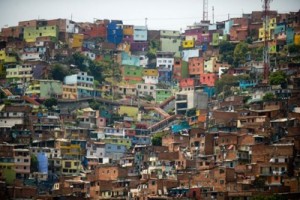 Lately social protection has made quite a spectacular comeback to the international cooperation agenda. In particular the role of social protection plays in alleviating and preventing poverty as well as creating social and economic development has now been largely recognised by international agencies, donors, governments and civil society organisations.
Lately social protection has made quite a spectacular comeback to the international cooperation agenda. In particular the role of social protection plays in alleviating and preventing poverty as well as creating social and economic development has now been largely recognised by international agencies, donors, governments and civil society organisations.
Based on the UN Social Protection Floor Initiative (2009), the ILO issued a Recommendation concerning social protection floors in 2012. 185 ILO member states have adopted this Recommendation, thus committing to provide basic social protection in their countries. This includes arrangements in the context of development cooperation. The Universal Declaration of Human Rights states in Article 22 in 1948: “Everyone, as a member of society, has the right to social security and is entitled to realization, through national effort and international co-operation and in accordance with the organization and resources of each state, of the economic, social and cultural rights indispensable for his dignity and the free development of his personality.”
Moreover global impoverishment and causes of poverty require more than ever responses at social policy level with instruments and concepts that go beyond national borders. The same applies to internationally generated resources for the funding of social security. The measures mentioned by the ILO include debt cuts or debt servicing, the adoption of a more accommodative macroeconomic framework as well as fighting illicit financial flows that amount to more than ten times the total aid received by developing countries.
The increasing international attention that the issue of social security has gained in recent years becomes also evident in the discussions and negotiations concerning the new development agenda (post-2015 Agenda). In this context it is the opinion of Bread for he World that the post-2015 Agenda should be implemented according to the principle of “common but differentiated responsibility”. One area, in which this responsibility can be realized, is international development cooperation.
The European Union (EU) and its Member States are the largest donors of Official Development Assistance (ODA). Social protection instruments belong to the most important measures in the struggle to end poverty in all its dimensions around the world.
This is the context in which this paper was produced. It is intended as an illustration of “development thinking” during recent years in the EU, presenting important programmes and instruments. It may serve as the basis for both political lobbying work within the EU as well as for practical implementation of social protection in the context of EU development cooperation.
Luise Steinwachs, Brot für die Welt, Germany
Francine Mestrum: Social Protection in Development Cooperation of the European Union (April 2015)
 The Committee on Economic, Social and Cultural Rights has elaborated the right to social protection’s normative content, as well as the core obligations governments have in respect of social protection. Furthermore, the ICESCR (International Covenant on Economic, Social and Cultural Rights) states that the full realisation of the rights recognised in its Covenant on ESCR should be achieved -inter alia -through international assistance and co-operation. It follows from this that the provision of social security for everyone is also an international responsibility.
The Committee on Economic, Social and Cultural Rights has elaborated the right to social protection’s normative content, as well as the core obligations governments have in respect of social protection. Furthermore, the ICESCR (International Covenant on Economic, Social and Cultural Rights) states that the full realisation of the rights recognised in its Covenant on ESCR should be achieved -inter alia -through international assistance and co-operation. It follows from this that the provision of social security for everyone is also an international responsibility.
National societies and their governments are the first in line to implement and finance social protection, but in particular low-income countries may need the support from the global community to eradicate extreme poverty and establish social protection systems. Against this background, the debate on international financing options should be intensified.
Given that national economies worldwide lose significant financial resources as a result of illicit financial flows, for example through money laundering and tax evasion, the international community should put more effort into controlling tax havens and tax exemption systems designed for international investment. Global cooperation is central to combating international tax avoidance and evasion. The lack of an international agenda in tax matters costs all governments a great amount of resources that could be invested into social protection.
In addition, new and effective taxes will have to be applied to the financial sector, such as taxes on financial transactions and financial activities. These resources could be budgeted for national social protection systems.
At present, there are no effective ways to manage debt rescheduling and debt relief. Debt service competes with development spending even in countries that do not suffer from an acute debt crisis. The possibilities of debt reduction and cancellation have to be explored to end the debt crisis and to allow countries to spend resources for i.e. social protection and poverty eradication.
In particular for low-income countries the financial support of other countries is indispensable, possibly at a progressively decreasing rate. Some countries may also need additional outside financing in times of crisis. This could be in the form of a special financing window within the context of existing global or regional institutions, or through the establishment of a specific fund for the financing of national social protection floors. A fund could provide re-insurance for countries where shock-related risks currently make it difficult for states to stick to their development trajectories.
In this context, any engagement of private institutions, particularly actors of “philanthrocapitalism”, has to be transparent, closely monitored, regulated and controlled by national governments, civil society and the international community.
The financing of social protection should eventually be based on sustainable and sufficient national resources, and a fair international trade and financial system.
Moreover, new approaches have to be elaborated that correspond to the global migration of labour. This development cannot easily be challenged by nationally defined systems, and it needs more intensive international cooperation such as the portability of entitlements for migrants.
Finally, further analysis is needed to ascertain the root causes of the structures and processes that lead to the rapid accumulation of wealth. It is not enough to create redistribution mechanisms, such as through social security, but it is necessary to challenge both the accumulation of wealth and the idea of infinite economic growth. Inequality is a major barrier to sustainable human development, as it has detrimental effects on both individuals and societies, and it makes it difficult to reduce poverty overall.
Luise Steinwachs, Brot für die Welt, Germany
See the full briefing paper Winning the Fight against Poverty and Inequality
Over 200 civil society organizations and trade unions unite to call for a Global Fund for Social Protection to protect the most vulnerable during COVID-19 and beyond.
The programme Improving Synergies Between Social Protection and Public Finance Management provides medium-term support to multiple countries aiming to strengthen their social protection systems at a national level and ensure sustainable financing. The programme aims to support countries in their efforts towards achieving universal social protection coverage.